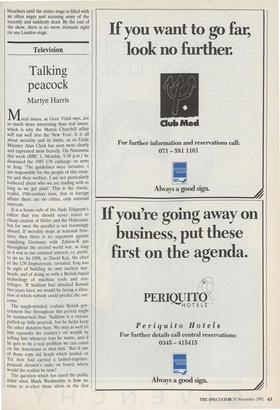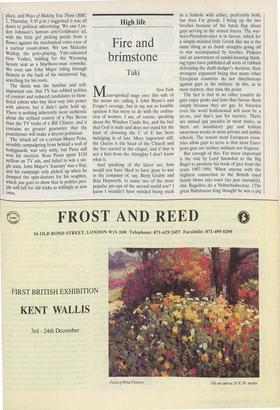Television
Talking peacock
Martyn Harris
Moral issues, as Gore Vidal says, are so much more interesting than real issues, which is why the Matrix Churchill affair will run well into the New Year. It is all about morality and its limits, as ex-Trade Minister Alan Clark has seen most clearly and expressed most bravely. On Panorama this week (BBC 1, Monday, 9.30 p.m.) he dismissed the 1985 UN embargo on arms to Iraq: 'The guidelines were intrusive. I am responsible for the people of this coun- try and their welfare. I am not particularly bothered about who we are trading with as long as we get paid.' This is the classic, realist, 19th-century view, that in foreign affairs there are no ethics, only national Interests.
It is a house-rule of the Daily Telegraph's editor that you should never resort to cheap citation of Hitler and the Holocaust, but for once the parallel is not boomingly absurd. If morality stops at national fron- tiers, then there is no argument against supplying Germany with Zyklon-B gas throughout the second world war, so long as it was in our national interest, i.e. profit, to do so. In 1988, as David Kay, the chief of the UN Inspectorate, revealed, Iraq was In sight of building its own nuclear war- heads, and of doing so with a British-based technology of machine tools and cen- trifuges. 'If Saddam had attacked Kuwait two years later, we would be facing a situa- tion of which nobody could predict the out- come.'
The tough-minded, realistic British gov- ernment line throughout this period might be summarised thus: 'Saddam is a vicious, puffed-up little peacock, but he helps keep the other dictators busy. We may as well let him squander his country's oil wealth by selling him whatever toys he wants, and if he gets to be a real problem we can count on the Americans to swat him.' But if one of those ropy old Scuds which landed on Tel Aviv had carried a lashed-together, Peacock dictator's nuke on board, where would the realists be now?
The question which has taxed the public mind since Black Wednesday is how we came to re-elect these idiots in the first
place, and Ways of Making You Think (BBC 2, Thursday, 9.30 p.m.) suggested it was all down to political advertising. We saw Lyn- don Johnson's famous anti-Goldwater ad, with the little girl picking petals from a flower against the mechanical voice-over of a nuclear count-down. We saw Malcolm Wallop, the polo-playing, Yale-educated New Yorker, bidding for the Wyoming Senate seat as a Marlboro-man cowpoke. We even saw John Major riding through Brixton in the back of his ministerial Jag, searching for his roots.
The thesis was the familiar and self- Important one, that TV has robbed politics of content and reduced candidates to blow- dried robots who buy their way into power with adverts, but it didn't quite hold up. There is nothing inherently more authentic about the stylised oratory of a Nye Bevan than the TV tricks of a Bill Clinton, and it contains no greater guarantee that the practitioner will make a decent politician.
The 'attack ad' on a certain Mayor Pena, invisibly campaigning from behind a wall of bodyguards, was very witty, but Pena still won his election. Ross Perot spent $150 million on TV ads, and failed to win a sin- gle state. John Major's 'Journey' was a flop, and his campaign only picked up when he dumped the spin-doctors for his soapbox, which just goes to show that in politics peo- ple will fall for old tricks as willingly as new ones.











































































 Previous page
Previous page